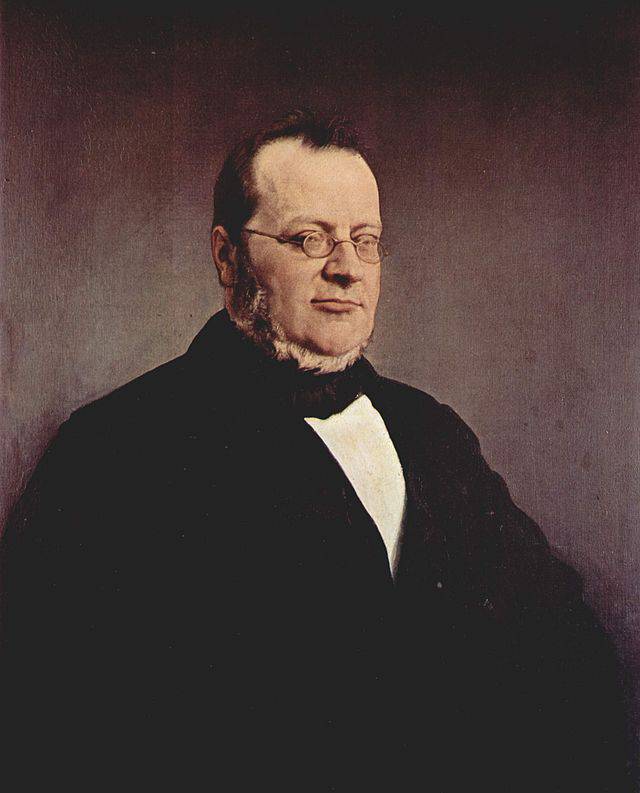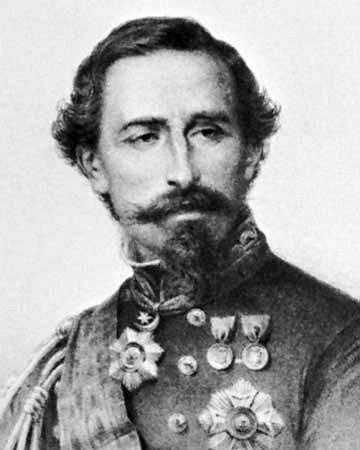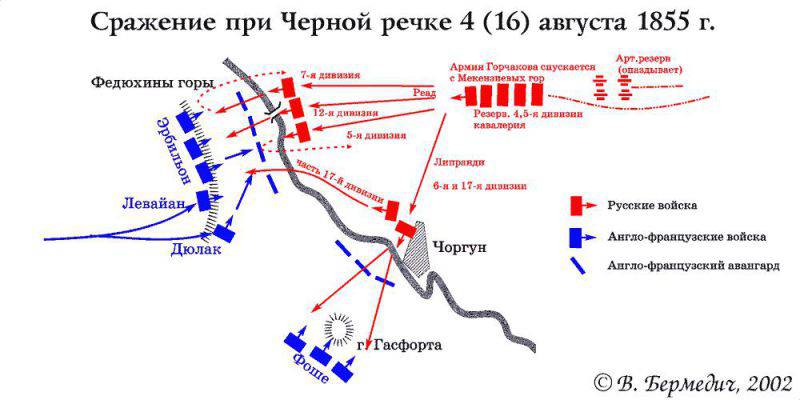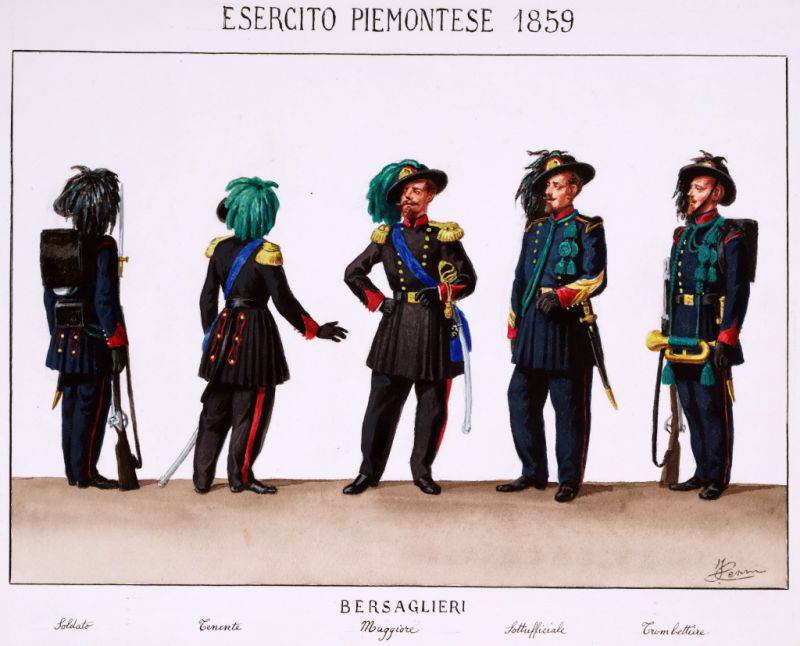Sardinian Kingdom vs Russia
3 February agreement was presented in the Chamber of Deputies and faced opposition from the right and left. Cavour was accused of the absence of a clear political course, a complete futility and untimely military agreement. According to MP Brofferio: "The union with Turkey was an insult to Piedmont and a disgrace for Italy." It was noted that the kingdom must fight, losing soldiers and big money, in the name of the enemies of Italy. However 10 February agreement with the Allies was ratified (for "» - 101 deputy, "against» - 60).
At the end of 1854 - in March 1855 went military preparations, formed the Sardinian expeditionary force. His commander was appointed Minister of War, General Alfonso Ferrero Lamarmore, who during the Austro-Italian 1848 — 1849 war, stood out as a capable officer and military administrator. The Italian troops were transported by British ships. 8 May 1855 The first Sardinian contingents arrived in Balaclava.
The decisive role in drawing Sardinia into a distant and, in fact, unnecessary Italy war in faraway Russia, was played by the Italian statesman Camillo Benzo di Cavour. A military engineer by training, Cavour was a supporter of the reforms and unification of Italy. A talented but unprincipled politician, has gone from a member of parliament and the Minister of Agriculture and Trade to the head of government. Inside the kingdom held a series of progressive reforms. Cavour's main focus was on international politics, where he pursued an anti-Austrian policy and hoped for the unification of Italy, led by Piedmont, with the help of France, which was Austria’s traditional rival. Hoping to raise the international prestige of the Kingdom of Sardinia, Cavour bowed King Victor Emmanuel to take along with France and Britain actively participate in the Eastern war.

Camillo Benzo di Cavour, Prime Minister of the Sardinian Kingdom
The war did not turn out as expected in Britain and France. Easy walk did not work. The allied forces suffered heavy losses, the siege of Sevastopol and the war dragged on. By the spring of 1855, France concentrated in the Crimea about a third of the metropolitan troops, as well as colonial contingents from Algeria, the Zouaves and the Foreign Legion. England, which traditionally did not have a large army, also exhausted its reserves. London had to take emergency measures to maintain the combat capability of the army. It started set in the Foreign Legion, which was created to supplement the army is in the Crimea. Its number should have been at least 10 thousand bayonets. The British hoped to find mercenaries in the German states and Switzerland. However, it was not possible to carry out a massive recruitment. In Germany were strong anti-British sentiments and the war with Russia was not sympathetic.
London and Paris urgently needed a new "cannon fodder". The British and French wanted to engage in a new war on the state. Increased pressure on Austria, but she continued to be cautious, although her hostility and forced Russia to keep on the western borders of an army of the most powerful forces that could not take part in the fighting at the Crimean theater (Austria vs Russia). Sweden offered to act against Russia. But the Swedes still remembered that the last clash with the Russians in 1808-1809. led to the loss of Finland, so wisely refused. However, Italy was out of Russian reach. weapons, and Cavour decided that a small war in the Crimea would not harm Sardinia, but, on the contrary, would strengthen her position in the struggle against Austria, which prevented the unification of Italy. In return for their participation in the war with Russia Cavour wanted the Duchy of Parma and Modena. In November 1854 was begun secret talks with representatives of Cavour England and France. In December, 1854 reached an agreement in principle. The governments of England and France officially invited Victor Emmanuel II, the Sardinian king, to take part in the war with Russia.
The Expeditionary Corps included: 1-I Infantry Division (2-I and 3-I Brigade), 2-I Infantry Division (4-I and 5-I Brigade), reserve 1-I infantry brigade, one cavalry field batteries with 36 tools. Sardinian buildings are located in the territory, which was under the responsibility of the commander of the British army. The headquarters of the Italian commander Alfons Lamarmor was located in the village of Kadykoy. The landing of the Sardinian corps in the Crimea continued until the beginning of June 1855. On 5 June 1855, the corps numbered 15 thousand soldiers.
15 June 1855 was passed by the Allied Military Council, which adopted a plan for a new attack on Sevastopol. June 17 planned to begin a massive bombardment of Sevastopol, June 18 - to begin the assault on the Great Redoubt and Malakhov Kurgan. In this case, the Piedmontese and the Turks, with the support of the French troops, were to make a demonstrative demonstration in the direction of the Russian army on Belbek. Early in the morning June 17 1-Sardinian Division I at the command of General Durando and reserve team under the temporary command of Colonel Giustiniani (instead of general Ansaldi) came out of the camp and going through the Black River on the eve of the elevated bridge, climbed the heights in Chorgun and come to Shuli. The 2 Division, under the temporary command of General Ansaldi (its commander Alessandro Lamarmore, brother of the commander, died of cholera) initially remained in the camp, but later joined the main forces. So the Sardinian corps received the baptism of fire.
On June 18, the Sardinians advanced. Russian troops repeated the same maneuver as on the 17th, fired at the enemy and retreated. On the same day, the Piedmontese flagship - the frigate "Carlo Alberto", was in a warrant on the outer raid of Sevastopol as part of the Union fleet. However, the allied fleet, taught by bitter experience, kept out of the reach of the coastal batteries of Sevastopol.
It must be said that the Allied Command wisely refrained from sending the Italians to the storming of Sevastopol. As the Ottomans, Italians used to solve the auxiliary problems. However, the failure of the Anglo-French troops and their huge losses immediately made a very negative impression on Sardinian officers and soldiers. Especially this impression is reinforced by the realization of the fact that the war in Sardinia and Russia is meaningless. Sardinian troops demanded that they be withdrawn from positions. General Lamarmor refused to give such an order. Then the Sardinian regiments left positions without permission and returned to the camp in a quick march. The Russians did not even understand what was happening. And when the Sardinians came to their senses, the trace was already gone, and they even abandoned part of their convoy. Sardinians defectors have stated that if the Russian immediately gave chase, the Sardinian troops would simply capitulated.
Sardinians, like other allied forces - the British, French and Turks, suffered greatly in the Crimea. Non-combat losses exceeded the fighting. Epidemics continued to mow the Allies. The soldier was tormented by a strong heat, a huge number of mosquitoes and flies. A shortage of drinking water began. I even had to set up armed posts at the sources to regulate water consumption. The morale of the troops was disgusting. Officers of boredom and feelings of inferiority played cards, lost everything, got into debt. Hierarchically and in terms of supply, the Italians were higher than the Turks, but much inferior to the British.
True, after the first difficulties, the Sardinians gradually established their field life. They built good barracks with glazed windows, wooden floors, with one or two small stoves. There were specialized barracks, equipped for hospitals, pharmacies, libraries, temples, warehouses and for other purposes. For horses and mules built stables. The supply situation has improved. Large stocks of food were created. So, when the Sardinians left the Crimea, they left provisions for four months: stocks of flour, crackers, salt, sugar, coffee, vegetables, canned meat, corned beef, condensed milk, wine, etc.
It is worth noting that after the first difficulties and difficult wintering, the Allied command adjusted the life of its soldiers. So allied forces generously supplied with food. The soldiers of the allied army, including the Italians, daily received coffee (three times), soup with beef and vegetables, potatoes, a portion of wine and vodka. The meat was usually fresh (animals were brought in), in case of shortage there were large stocks of canned meat and vegetables. Officers had the right to take additional products from state-owned stores at the expense of salaries at moderate wholesale prices. Even at remote posts they received fresh wheat bread. In this regard, the Allies could learn.
The first real battle Italians entered 4 (16) in August 1855, during the Battle of the Chernaya. Auxiliary corps, Sardinian and Turkish, occupied defenses on the right flank near the village of Chorgun. Here was located an important height - Gasfortov Mountain. Sardinian troops occupied the following positions: on the right flank, by the Varnutka river, the Durado 1 division was located, on the left - Trotti 2 division (Ansaldi died of cholera), in reserve there was a brigade of Justiniani, a cavalry regiment and all artillery. Total Italian troops consisted of 25 battalions, 4 squadron and 36 guns.
4 August Russian artillery shelled the enemy. Then to storm the enemy positions went to the troops of General Liprandi (17 70 battalions of infantry guns). Later they were supported by the backup 5-division. As a result, the Sardinians could be in the center of the Russian offensive. But when the Russian troops had already climbed the Telegraph Mountain, a new order was received to go to the Russian right flank, to the Tavern Bridge at the disposal of General Read. That is, the Russian commander Gorchakov, fascinated by the initial success of the right wing, decided to abandon the attack on the left flank and increase Read's onslaught on the Fedyukhiny Mountains.
As a result, the Italians avoided the main attack. In this battle, the Sardinian infantry and artillery successfully fired from the Russian troops, and the Bersaliers (selected Italian riflemen) were able to use the bold maneuver to enter the flank of the Russian units and helped the French in the area of the Tavern bridge. In this battle, the Sardinians lost about 250 people, including Brigadier General Count Montevecchio. The Moroccan Zouawes from the colonial units of the French army, in recognition of the bravery of the Italian soldiers, presented their hats to the Sardinian Bersaliers. As a result, burgundy cap-fez with a blue tassel on a string is the second characteristic formless headdress Bersagliere. The first sign of their front hat shape was characteristic with lateral feathers plume of grouse or pheasant (so-called "Vaira").
Bersalieri
During the decisive assault on Malakhov mound 27 August (8 September), the Sardinian corps, consisting of four infantry brigades, a cavalry regiment and five artillery batteries, was in reserve, in trenches opposite the 4 bastion. On this day, Sardinians lost 40 people killed and wounded in shootouts with Russian troops. After that, the Italian troops in active hostilities did not participate. Thus, the combat losses of Sardinians in the war were small. Much more died from illnesses - more than 2 thousand people.
The participation of Sardinian troops in the Eastern War did not cause financial difficulties. Officially, the money spent by Piedmont on the war did not exceed the average annual expenditure on the army in peacetime. In 1854, 9,5 million rubles were spent, the same in 1855. However, military expenditures were included in other budget items and in addition made 8 million 750 thousand rubles over two years. In addition, Sardinia took a loan from the British, from which 6,5 million was spent on the war.
Cavour succeeded in inviting Sardinia to a peace congress. 18 (30) March 1856. A peace treaty was signed. But hopes of Cavour that as compensation for the Kingdom of Sardinia participated in the Eastern war the great powers consider the "Italian question" did not materialize. The peace agreement did not say a word about the Italian states.
At one of the meetings of the Cavour Congress was able to put the "Italian question", but no action was taken. The British and French only condemned the situation in the Papal State and the Kingdom of the Two Sicilies. Representatives of Austria, Prussia and Russia reported that they do not have the authority to discuss this issue. Cavour protested, saying that the situation in Italy constitutes a threat to European peace, as the Austrian domination over a large part of the peninsula is the revolutionary ferment. Intimidate Europeans the possibility of a new revolution, Cavour attempted to persuade the great powers to solve the "Italian question" in the interests of the Sardinian ruling dynasty. However, his speech was cool. When Cavour tried on the sidelines to raise the issue of joining Sardinia to the duchies of Parma and Modena as compensation for participation in the war, the allies waved off these demands.
Thus, the Sardinian kingdom did not receive anything as a result of the Eastern War. In fact, London and Paris used Sardinia for their own purposes, but gave nothing in return. It was the traditional policy of Britain - to use other countries as "figures" on the European and world "chessboard."
However, after a few years, the hopes of the Sardinians came true. In 1858, Napoleon III and Cavour concluded a secret alliance against Austria. When the French smashed the Austrians, Russia occupied a benevolent neutrality towards France. For Vienna everything turned out badly. Now the Russian army was on the border of Austria, holding down part of the Austrian army. France and Sardinia won. France received from the Sardinian kingdom Savoy and Nice. Lombardy passed to the Sardinian kingdom. However, in the end, Napoleon deceived Gorchakov, not agreeing to help in mitigating the terms of the Paris Treaty.
It is worth saying that Russia did not punish Sardinia, unlike Austria. On the Russian-Italian relations, this war had no effect. When in 1860, the Austrian emperor Franz Joseph decided to take revenge for the defeat in 1859, and mobilized the army, preparing to strike at Sardinia, Russia saved the Sardinians. Chancellor Gorchakov organized a meeting of three monarchs (Russian, Austrian and Prussian) in Warsaw. And the emperor Alexander II threatened Franz Joseph that he would not allow the strengthening of Austria at the expense of the Sardinian kingdom.
The French also miscalculated, hoping to preserve Italy, fragmented and dependent on external forces. In 1859-1860 Giuseppe Garibaldi overthrew the rulers of Tuscany, Parma, Modena from the thrones. Soon these Italian states united with Sardinia. In the 1861, it was announced the establishment of the Kingdom of Italy led by the Piedmont King Victor Emmanuel II.
After about a quarter of a century after the end of the Crimean War, the Italians were allowed to open a memorial in the Crimea. The Italians chose the area of Mount Gasfort. 28 August 1882, in the presence of the Italian military delegation, the grand opening of the memorial was held. The cemetery occupied an area of about 290 square meters, in the center of the project engineer Major Gerardi built a chapel in Lombardo-Piedmont style, under which there was a crypt. The remains of generals Alessandro Lamarmore, Giorgio Ansaldi and Rodolfo de Montevecchio, officers and soldiers were buried in it. In November 1955, the chapel was bombed. After 1991, the memorial sign was restored.

Commander of the Sardinian Corps in Crimea Alfonso Ferrero Lamarmor


Information